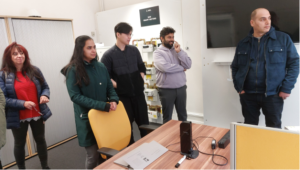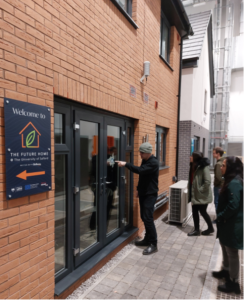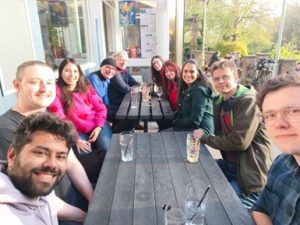About the Spring School 2023 at the University of Salford, 24-27 April.
This analysis training event was a condensed format of the regular Summer School, which has been organised for over a decade and which has attracted over 200 participants. Lectures have covered important aspects of dynamic data analysis applied to real data from in-situ measurements.
After two years of webinars, we were happy to be able to organise a 4-day physical training event again. We have found that the interaction between participants and lecturers, and participants of different backgrounds is essential in developing the skills to do proper data analyses, which is much more difficult in an online setting. Doing analysis exercises brings up a lot of questions by the participants that can be responded immediately by the available lecturers. The programme therefore was organised in such a way that about half of the time was devoted to lectures and the other half to practical exercises using real data from outdoor experiments and available tools.
The four days program contained more than 12 lectures. Five enthusiastic lecturers have presented several aspects of dynamic mathematical techniques for the analysis of data that represents the thermal behaviour of buildings. Introduced have been discrete time as well as continuous time models and methods. The software tool LORD (for Windows) was distributed and the recent version of CTSMR-TMB was presented in a crash course, also. A step-by-step exercise was followed using the latest version of R and the R-toolbox and R-Studio (March 2023). Several high-quality data series, that have been developed in the past by the DYNASTEE network, were made available to the participants, including detailed documentation about the experimental setup, like sensors and instrumentation and creation of several test periods with different indoor temperature regimes. These data were applied to both LORD and CTSMR. See also: www.dynastee.info in the data-analysis/overview section: a recent extensive paper presenting the data analysis process applied to high quality data from an outdoor experiment can be downloaded for free. Discussed were the uncertainty issues converting from building physical models to mathematical models for the analysis process.
Application examples of the distributed data have been discussed as well as smart metering data for the energy performance assessment of buildings. A visit to the impressive and recently inaugurated Energy House 2.0 showed two real size houses that were under test in the laboratory. Innovative constructions and materials are applied and tested under a variety of climatic conditions. The smart metering laboratory in the nearby Joule house was visited also. Several types of smart meters are tested in particular for communication with different parties.
At the end of the Spring School week, the first European Building Performance Symposium took place on the 28th April 2023. This day was jointly organised by the University of Salford and the DYNASTEE network.
Last couple of years were a-typical; the decision was made to postpone the Summer Schools (2020 to 2022) for good reasons and replace it by webinars. However, DYNASTEE has already started organising the next Summer School to take place in Almería in Spain in September 2024. This will be a 6-days full Summer School with classroom-based learning sessions and interactive sessions. Feel free to contact mjose.jimenez@psa.es



